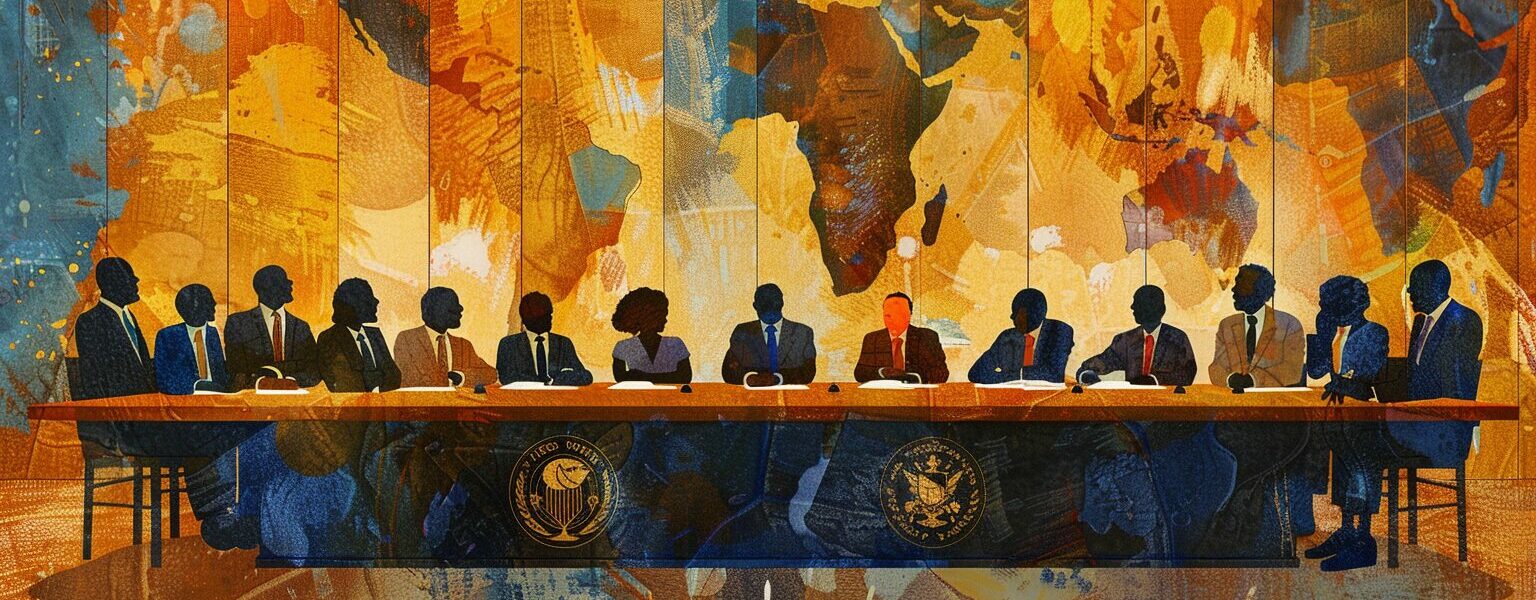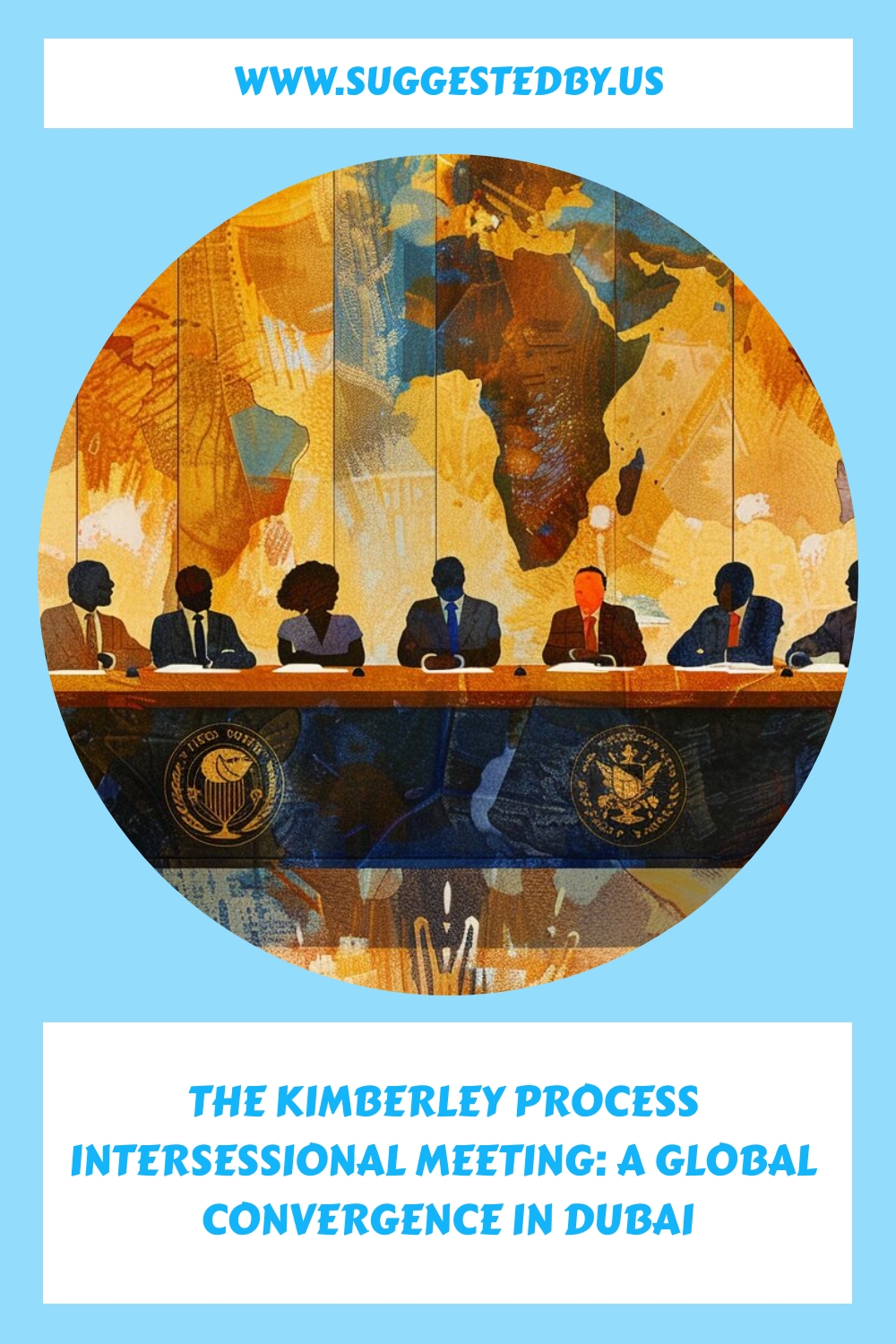The Kimberley Process Intersessional Meeting: A Global Convergence in Dubai
The upcoming Kimberley Process Intersessional Meeting in Dubai marks a pivotal moment for the global diamond industry. The DMCC and the Government of Dubai Authority are hosting this event, which will bring together important figures from the diamond industry, civil society, and international governments. As the UAE takes the helm as the Chair of the Kimberley Process in 2024, the focus is on delivering concrete results for the long-term security and efficiency of the diamond market.
Article Contents
Understanding the Kimberley Process
The United Nations’ international initiative, known as the Kimberley Process, is crucial in regulating the diamond trade on a global scale. With 85 participating countries, its primary objective is to prevent conflict diamonds from entering the legitimate diamond market, thereby safeguarding the integrity of the industry. Let’s delve deeper into the origins, objectives, and significance of the Kimberley Process.
Origins of the Kimberley Process
The Kimberley Process was born out of a pressing need to address the issue of conflict diamonds, which were fuelling wars in several African nations. The United Nations, recognizing the devastating impact of these diamonds on vulnerable communities, spearheaded the establishment of the KP to put an end to this illicit trade.
Since its inception, the Kimberley Process has created a transparent and accountable framework for diamond certification, ensuring that only ethically sourced diamonds make their way to the market. By tracing the journey of diamonds from mines to retailers, the KP has brought about greater accountability and responsibility within the industry.
Role of the KP in Regulating the Global Diamond Trade
As a regulatory body, the Kimberley Process plays a crucial role in overseeing the flow of rough diamonds across borders. Through stringent monitoring and certification mechanisms, the KP verifies that each diamond is conflict-free, thereby upholding the ethical standards of the diamond trade.
Participating countries collaborate under the KP to implement robust control measures that prevent the infiltration of conflict diamonds into the supply chain. By enforcing strict guidelines and conducting regular audits, the Kimberley Process ensures the credibility and integrity of the diamond market, fostering trust among consumers and industry stakeholders alike.
Significance of Preventing Conflict Diamonds in the Market
The significance of preventing conflict diamonds from entering the market cannot be overstated. By curbing the trade of illicit diamonds, the Kimberley Process not only protects the industry’s ethical integrity but also safeguards the livelihoods of communities dependent on legitimate diamond mining.
Conflict diamonds, often associated with human rights abuses and funding of armed conflicts, have far-reaching consequences that extend beyond the realms of commerce. The KP underlines the importance of responsible sourcing and sustainable practices within the diamond sector through its stringent regulations and enforcement mechanisms.
The Kimberley Process sets a benchmark for ethical trade practices in the global diamond industry by championing transparency, accountability, and ethical standards. As the KP continues its efforts to combat the trade of conflict diamonds, it reinforces the collective commitment towards a more sustainable and ethical diamond market.
Insights into the KP Intersessional Meeting
As it travels to Dubai for the upcoming Kimberley Process (“KP”) Intersessional Meeting, which the Government of Dubai Authority on Commodities Trade and Enterprise and DMCC, the world’s premier free zone, are hosting, the global diamond industry is buzzing.
Location and Host of the Meeting in Dubai
The KP Intersessional Meeting will be held in the impressive setting of DMCC’s Uptown Tower headquarters, located in the vibrant Uptown Dubai. This choice of venue reflects the importance and grandeur of the event, signaling a momentous gathering of key players in the diamond industry. The event promises to foster meaningful discussions and collaborations that will shape the future of the global diamond trade. Additionally, the KP Intersessional Meeting will serve as a platform to celebrate significant milestones, such as the much-anticipated Platinum Born UK Launch, which highlights innovation and growth within the jewelry sector. Attendees can expect a dynamic agenda, coupled with networking opportunities in one of Dubai’s most prestigious business hubs.
Participants and Key Stakeholders Attending
This prestigious event will see a diverse assembly of participants, including representatives from the global diamond industry, civil society members, and government officials from around the world, converging on Dubai. Among those attending are industry experts, policymakers, and stakeholders who play pivotal roles in shaping the future of the diamond trade.
Agenda Items and Discussions Planned for the Event
The agenda for the KP Intersessional Meeting is packed with crucial discussions focused on addressing pressing issues and evaluating the progress of the Kimberley Process. Under the UAE’s 2024 programme themed “Year of Delivery,” the emphasis is on ensuring the long-term security, efficiency, and operationalization of the KP.
During the week-long series of meetings, participants will have the opportunity to engage in in-depth dialogues aimed at advancing the objectives of the Kimberley Process and driving constructive outcomes for the global diamond community. With a special plenary session secured to expedite decision-making, the event is poised to facilitate substantial strides towards enhancing the sustainability and integrity of the diamond market.
Ahmed Bin Sulayem, Executive Chairman and Chief Executive Officer of DMCC, and the current Chair of the Kimberley Process for 2024, expressed enthusiasm about the gathering, highlighting its significance in shaping the future trajectory of the diamond industry. With various geopolitical dynamics at play, the intersessional meeting presents a pivotal moment for charting a course towards a prosperous future for the Kimberley Process and its stakeholders.
The Kimberley Process Certification Scheme (KPCS), overseen in the UAE by the Ministry of Economy and managed by DMCC, underscores the nation’s commitment to upholding the integrity of the diamond trade. The UAE’s exponential growth in rough and polished diamond trade further underscores its pivotal role in the global market.
Through the Dubai Diamond Exchange (DDE) at the iconic Almas Tower, the UAE has positioned itself as a hub for legitimate diamond trade, offering a comprehensive platform for industry players to engage in secure and transparent transactions. The thriving ecosystem at the DDE caters to over 1,300 diamond companies, fostering a culture of trust and innovation within the industry.
With an array of strategic discussions and collaborative efforts on the agenda, the KP Intersessional Meeting in Dubai promises to be a cornerstone event for the global diamond sector, heralding a new chapter of progress and cooperation in the realm of diamond regulation and trade.
The UAE’s Leadership in the Diamond Industry
In 2024, the United Arab Emirates (UAE) assumed the Chair of the Kimberley Process, a significant responsibility that underlines the country’s commitment to the global diamond industry’s security and efficiency. The Kimberley Process Intersessional Meeting, hosted in Dubai, serves as a pivotal gathering for industry stakeholders, civil society, and government representatives to address key issues and drive decision-making processes.
Role of the UAE as Chair of the Kimberley Process in 2024
As the Chair of the Kimberley Process, the UAE has undertaken the important task of overseeing the long-term security, efficiency, and operationalization of the Kimberley Process. This role signifies the UAE’s dedication to ensuring that unregulated rough diamonds do not enter the legitimate diamond market, thereby preventing the financing of conflicts through diamond trade.
Efforts towards Enhancing Security and Efficiency in the Diamond Trade
Under the theme “Year of Delivery,” the UAE’s focus in 2024 is on achieving tangible results that enhance the security, efficiency, and operationalization of the Kimberley Process. By providing a platform for members and participants to assess progress and address pressing issues, the UAE aims to propel the global diamond industry forward.
The UAE’s efforts to manage the import and export procedures for rough diamonds through the Dubai Diamond Exchange have contributed to the growth of the diamond trade in the region. With a combined trade value of USD 38.3 billion, the UAE has established itself as a key player in the international diamond market.
Special Plenary Session to Drive Decision-Making
One of the notable achievements of the UAE’s chairmanship in 2024 is securing a historic special plenary session during the Kimberley Process Intersessional Meeting. This session accelerates decision-making processes and allows for critical discussions and resolutions that are vital for the prosperity of the global diamond community and producing nations, particularly those in Africa.
Ahmed Bin Sulayem, Executive Chairman and CEO of DMCC, emphasized the importance of seizing this opportunity to shape the future of the Kimberley Process. The special plenary session enables stakeholders to drive discussions that will have far-reaching implications for the industry.
In conclusion, the UAE’s leadership in the diamond industry as the Chair of the Kimberley Process in 2024 signifies a commitment to ensuring the sustainability and integrity of the global diamond trade. Through strategic initiatives, collaboration with industry stakeholders, and proactive decision-making, the UAE is driving positive change and shaping the future of the diamond industry.
Key Discussions and Outcomes
In the realm of the global diamond industry, a significant event is underway as world governments and industry representatives convene in the United Arab Emirates for the Kimberley Process Intersessional Meeting. Hosted by DMCC, the flagship free zone and Government of Dubai Authority on commodities trade and enterprise, this gathering holds the promise of addressing pivotal issues and shaping the future of the Kimberley Process (KP).
Focus on Long-Term Sustainability and Operationalisation of the KP
One of the central themes of the discussions revolves around the long-term sustainability and operationalisation of the KP. With the UAE spearheading the efforts under the “Year of Delivery,” there is a concerted push to secure the body’s efficiency and security for years to come. Ahmed Bin Sulayem, the Executive Chairman and CEO of DMCC, emphasized the importance of this agenda in light of the current geopolitical pressures and market forces affecting the diamond industry.
Geopolitical and Market Challenges Facing the Diamond Industry
As the diamond industry grapples with a myriad of challenges, including geopolitical uncertainties and evolving market dynamics, the discussions aim to address these complexities head-on. The intersessional meeting provides a platform for stakeholders to assess the impact of these challenges and strategize on mitigating risks while fostering growth and sustainability.
Importance of Resolutions for Global Diamond Community and Producer Nations
The resolutions put forth during this meeting hold immense significance for the global diamond community and producer nations, particularly in Africa. These decisions not only impact trade regulations but also play a crucial role in ensuring that the diamond market remains free from conflict financing and operates with transparency and integrity. The outcomes of these deliberations are poised to shape the future trajectory of the diamond industry on a global scale.
As the discussions unfold in Dubai, stakeholders from various sectors are poised to collaborate and drive meaningful change within the diamond industry. The commitment to fostering sustainability, addressing challenges, and forging resolutions underscores the collective dedication towards ensuring a thriving and responsible diamond trade landscape for all.
Implications for the Global Diamond Market
Following the recent announcement by DMCC, the world’s flagship free zone and Government of Dubai Authority on commodities trade and enterprise, regarding the upcoming Kimberley Process Intersessional Meeting in Dubai, the global diamond industry is bracing for significant implications. This pivotal event is set to shape the future of the diamond trade in more ways than one.
Potential Impact of Decisions Made at the Meeting
The decisions made at the upcoming Kimberley Process Intersessional Meeting in Dubai are expected to have far-reaching implications on the global diamond market. With representatives from the diamond industry, civil society, and world governments coming together, crucial decisions will be made to address pressing issues affecting the industry. These decisions will not only impact the operational aspects of the diamond trade but also its long-term security and efficiency. The discussions at the Intersessional Meeting will also have a significant influence on global diamond jewellery design, as potential changes in regulations and practices could affect the availability and sourcing of diamonds for designers and manufacturers. The decisions made will shape the future of the diamond industry, from the mines to the market, and will ultimately impact how diamonds are sourced, traded, and used in global jewellery design. This meeting is a crucial opportunity for stakeholders to come together and collaborate on shaping the future of the diamond industry in a sustainable and responsible manner.
Future Outlook for the Diamond Trade post-KP Intersessional
Post the KP Intersessional Meeting, the diamond trade is likely to witness a significant shift in its trajectory. The outcomes of the meeting will play a vital role in shaping the future of the industry, setting the course for the coming years. The focus on delivering concrete results for the long-term security and operational effectiveness of the Kimberley Process signifies a commitment towards ensuring a sustainable and thriving diamond trade globally.
Role of the UAE in Shaping the Future of the Diamond Industry
The UAE, as the host of the Kimberley Process Intersessional Meeting and the Chair of the Kimberley Process in 2024, holds a crucial position in shaping the future of the diamond industry. With a focus on accelerating decision-making and driving discussions towards the prosperity of the global diamond community and producer nations, especially in Africa, the UAE is instrumental in steering the industry towards a more secure and efficient future.
In summary, the decisions taken at the upcoming Kimberley Process Intersessional Meeting in Dubai will have a significant impact on the global diamond market, influencing its future trajectory. With the UAE playing a pivotal role in driving these decisions, the industry is poised for positive changes that prioritize long-term security, efficiency, and prosperity.






